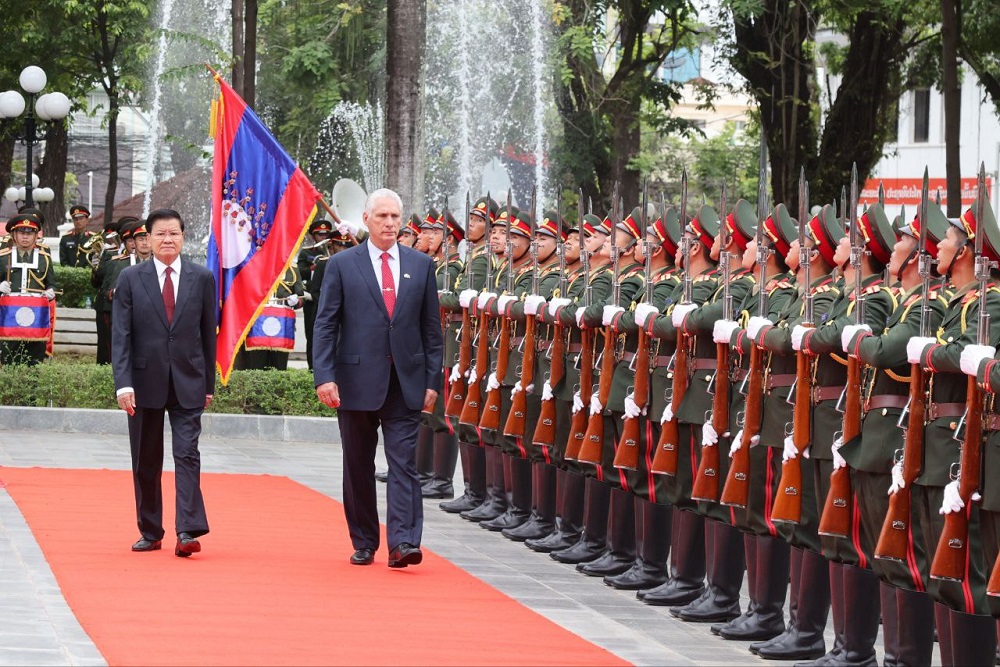In a state visit hailed as a “historic milestone” for bilateral relations, the First Secretary of the Central Committee of the Communist Party of Cuba and President of Cuba, Miguel Díaz-Canel Bermúdez, held talks this Wednesday in Vientiane with his Laotian counterpart, Thongloun Sisoulith, in a meeting marked by brotherhood and the reaffirmation of cooperation between the two socialist countries. The Cuban leader’s agenda began with a deeply symbolic act: the laying of a wreath at the Monument to the Unknown Soldier in Laos. In a solemn ceremony, Díaz-Canel paid tribute to the members of the Pathet Lao who sacrificed their lives during the Thirty Years’ Struggle (1945-1975) for national liberation.
The imposing monument, with its seven platforms crowned by a stupa and a golden star, was the setting for this gesture of respect and admiration for Laos’ national history, a formal ritual that reflects the commitment to the memory of its ancestors and revolutionaries.
After welcoming the Caribbean Head of State with a warm embrace at the Presidential Palace and performing the ceremony in front of the troops arrayed in his honor, the President of Laos offered him “a warm and fraternal welcome” during the official talks.
“I firmly believe that your visit will be another historic milestone in strengthening and enhancing our friendly relations,” Sisoulith said, after recalling recent bilateral meetings in Vietnam and China.
Upon his arrival, Díaz-Canel expressed his gratitude for the “expression of affection and hospitality” and conveyed a “warm greeting” from Army General Raúl Castro Ruz, to whom the Laotian government also extended its sympathy.
In his speech, the Cuban President referred to Sisoulith as a “brother, friend, and dear comrade.”
“I always realize that our friendship is sincere, honest, and as strong as the relations between our nations and peoples,” Díaz-Canel stated. “Because whenever we meet, on both sides, a smile and affection immediately arise when we greet each other.”
The president emphasized that his visit reflects the “high importance” Cuba places on developing bilateral ties and political dialogue with Laos, with whom they share “close, indestructible, and historic ties of friendship and collaboration.”
The meeting was attended by a large, high-level delegation from the Laotian government, demonstrating the priority the host country places on this relationship. The head of the Foreign Affairs Commission of the Party Central Committee, as well as representatives from the Ministries of Education, Agriculture, Environment, Industry, and Commerce, were also present, suggesting a comprehensive work agenda that seeks to deepen cooperation in multiple sectors.
Likewise, the tribute ceremony at the sacred precinct of That Luang was not merely a ceremonial gesture, but a symbol of brotherhood between two peoples who equally honor their heroes and build, on the pillar of memory, a future of mutual cooperation.
Also this morning, the Cuban Head of State was received at the headquarters of the Laotian government by the Prime Minister of that Asian country.
It is a new opportunity, he said, to continue developing bilateral relations and strengthening the brotherhood between both parties, governments, and peoples, “proof of which,” he noted, “is the successful exchange he held today with our General Secretary of the Party Central Committee and President, Comrade Thongloun Sisoulith.”
Siphandone recalled the fruitful visit to Laos by Prime Minister Manuel Marrero Cruz, to whom he sent warm greetings. He also extended his condolences to the President of the National Assembly, Esteban Lazo Hernández, who came to Vientiane last year to participate with the Laotian people and their authorities in the celebrations marking the 50th anniversary of the establishment of diplomatic relations.
The Cuban president recalled the date as a symbol of the ties between the two peoples, whose friendship and collaboration dates back to the 1960s and 1970s, when Cuban doctors were welcomed into the Viengsay caves to provide care to the Laotian people during their liberation struggle.
It is a friendship, he added, that was forged through the close ties created by Commander-in-Chief Fidel Castro Ruz and Laotian national hero, President Kaysone Phomvihae. And it was in that relationship of friendship, of brotherhood—Díaz-Canel noted—that our generation grew up, so we are its heirs and will continue to be committed to that relationship.
The Head of State conveyed to Prime Minister Sonexay Siphandone warm greetings from his colleague, Manuel Marrero Cruz, and extended an invitation to visit Cuba when his schedule allows.
Díaz-Canel’s Asian tour, which included stops in Vietnam and China and culminated in Laos, strengthens South-South diplomacy and ties between allied countries that share a common history of anti-colonial struggle and the defense of their own socialist path.


